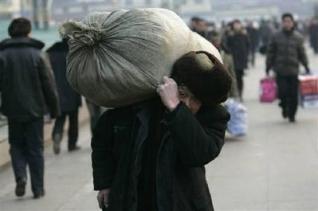
Mass job destruction as result of crisis - 40 percent of global sackings occured in China
Source: chinaworker.info
China has lost up to 41 million jobs since the global capitalist crisis began last year, according to a report from a top government think-tank. This accounts for approximately 40 percent of redundancies around the world. Despite the government's big stimulus package and unprecedented bank credit loosening, 23 million - over half those made redundant - are still without work.
The number of redundancies far exceeds the government's official figures and means that Chinese workers, who account for around one-fifth of the global labour force, but two-fifths of the job losses - have suffered disproportinately during the global crisis.
These startling figures are published in a new report from the Chinese Academy of Social Sciences (CASS), the top government body for social research, in its annual Green Book on Population and Labour. The crisis of the last 12 months has caused the closure of tens of thousands of factories, especially in the export sector which is dependent on shrinking Western consumption.
Professor Cai Feng, director of the study, told the press that the funding contained in the government's stimulus measures, 4 trillion RMB (almost $600bn), was aimed at "GDP-boosting" rather than creating jobs. The authors say this sum could create 40 percent more jobs if invested differently, echoing other critics of the stimilus plan who point out that the imbalance towards prestigious infrastructure projects does not create so many new jobs.
The CASS report starkly contradicts official government estimates. Last month, China's Labour Minister said the crisis had caused "only" 16.5 million new unemployed, of which 9 million were migrants from rural areas. Once again this raises serious questions about the reliability of official statistics. China's official urban unemployment rate is only 4.3 percent, even this is the highest level since 1980, but a figure that cannot be taken seriously.
AFP quotes official sources as saying that three million university graduates, including those who left one year ago, are still without work. Of this year's leavers, 68 percent are said to have found work. "Hangzhou has lots of unemployed undergraduates now," said a job agency spokesman in the southeastern city, which has just launched "job hunting maps" to help graduates find work.
Asian jobs crisis
China and most of East Asia have been savaged by the capitalist crisis, despite all the "recovery" hype of recent weeks. The Asian Development Bank has estimated that jobs in the region's export industry fell by as much as 7 percent through the first quarter of 2009 from a year earlier. Once again this figure translates into tens of millions of lost jobs. Rising unemployment has been "more pronounced" in Asia's more advanced economies such as China, South Korea, Taiwan and Singapore, the ADB said in its report. It warned that jobless rates may also mask movements from manufacturing to "informal jobs" and growing underemployment. Taiwan's unemployment rate hit 6.01 percent in July, the highest rate since 1978. Japan's new government inherits a record post-war unemployment level of 5.7 percent.
Across the region there is a need for fighting trade unions, democratically controlled by their members, to refuse to accept redundancies and closures, to demand an opening of company accounts when bosses plead economic hardship, and to fight for a state takeover under democratic workers' control and management of any company threatening job cuts. It is urgent that unions help to organise the mass of unemployed, to fight for work or full pay, no return to mass poverty, and for a shorter working week without loss of pay. The capitalism system has demonstarted its rotteness and bankruptcy on a world scale. It must be replaced by a system of democratic socialism whereby big companies and banks are no longer casinos for the super-rich, but public resources run for and controlled by the people as a whole.
